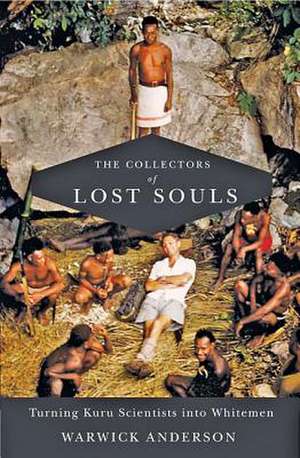The Collectors of Lost Souls – Turning Kuru Scientists into Whitemen
Autor Warwick Andersonen Limba Engleză Paperback – 21 oct 2019
Winner, Ludwik Fleck Prize, Society for Social Studies of Science
Winner, General History Award, New South Wales Premier's History Awards
When whites first encountered the Fore people in the isolated highlands of colonial New Guinea during the 1940s and 1950s, they found a people in the grip of a bizarre epidemic. Women and children succumbed to muscle weakness, uncontrollable tremors, and lack of coordination, until death inevitably supervened. Facing extinction, the Fore attributed their unique and terrifying affliction to a particularly malign form of sorcery.
In The Collectors of Lost Souls, Warwick Anderson tells the story of the resilience of the Fore through this devastating plague, their transformation into modern people, and their compelling attraction for a throng of eccentric and adventurous scientists and anthropologists. Battling competing scientists and the colonial authorities, the brilliant and troubled American doctor D. Carleton Gajdusek determined that the cause of the epidemic--kuru--was a new and mysterious agent of infection, which he called a slow virus (now called a prion). Anthropologists and epidemiologists soon realized that the Fore practice of eating their loved ones after death had spread the slow virus. Though the Fore were never convinced, Gajdusek received the Nobel Prize for his discovery.
Now revised and updated, the book includes an extensive new afterword that situates its impact within the fields of science and technology studies and the history of science. Additionally, the author now reflects on his long engagement with the scientists and the people afflicted, describing what has happened to them since the end of kuru. This astonishing story links first-contact encounters in New Guinea with laboratory experiments in Bethesda, Maryland; sorcery with science; cannibalism with compassion; and slow viruses with infectious proteins, reshaping our understanding of what it means to do science.
Preț: 201.69 lei
Preț vechi: 252.05 lei
-20% Nou
Puncte Express: 303
Preț estimativ în valută:
38.60€ • 40.05$ • 32.26£
38.60€ • 40.05$ • 32.26£
Carte indisponibilă temporar
Doresc să fiu notificat când acest titlu va fi disponibil:
Se trimite...
Preluare comenzi: 021 569.72.76
Specificații
ISBN-13: 9781421433608
ISBN-10: 1421433605
Pagini: 352
Dimensiuni: 164 x 220 x 22 mm
Greutate: 0.48 kg
Ediția:Updated
Editura: Johns Hopkins University Press
ISBN-10: 1421433605
Pagini: 352
Dimensiuni: 164 x 220 x 22 mm
Greutate: 0.48 kg
Ediția:Updated
Editura: Johns Hopkins University Press
Notă biografică
For almost thirty years Warwick Anderson, medical doctor and historian of science, has been studying kuru, those who were affected by the disease, and the scientists who identified and investigated it. Based at the University of Sydney, he is the Janet Dora Hine Professor of Politics, Governance and Ethics in the Department of History. He is the author of Colonial Pathologies: American Tropical Medicine, Race, and Hygiene in the Philippines and the coauthor of Intolerant Bodies: A Short History of Autoimmunity.
Descriere
This astonishing story links first-contact encounters in New Guinea with laboratory experiments in Bethesda, Maryland; sorcery with science; cannibalism with compassion; and slow viruses with infectious proteins, reshaping our understanding of what it means to do science.
